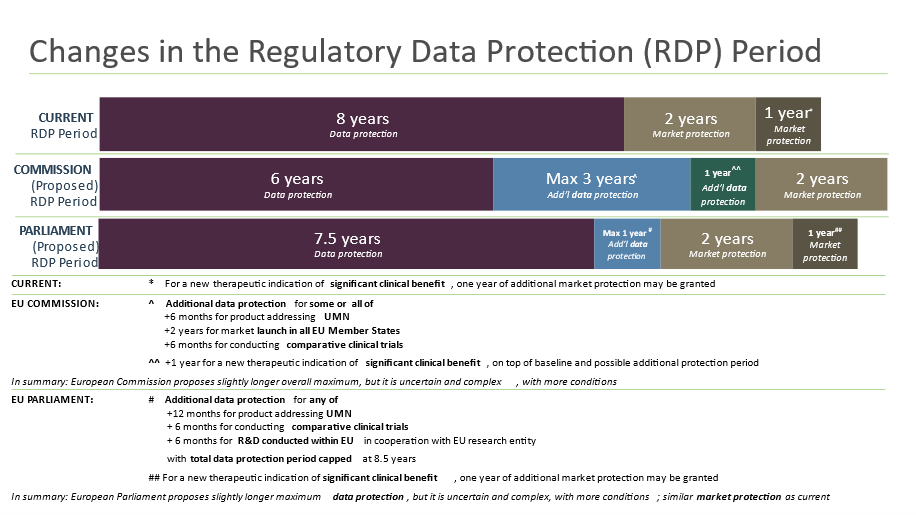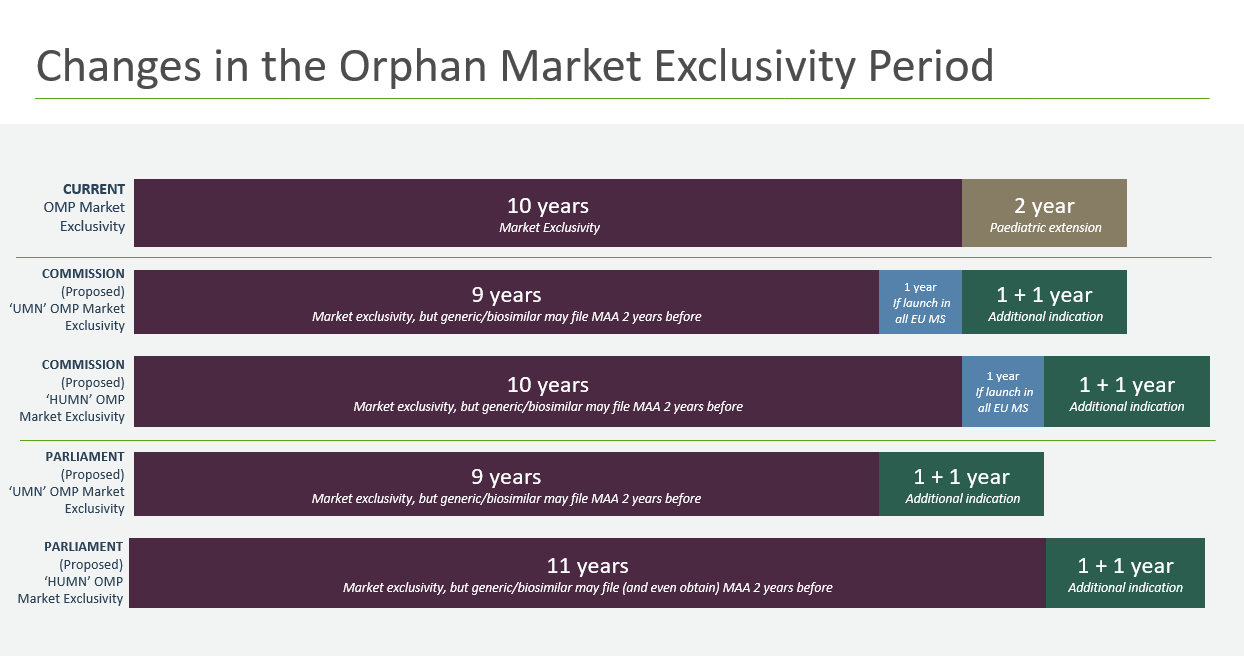Background
Just under a year ago on 26 April 2023, the European Commission published a proposal for the revision of the general pharmaceutical legislation, which will repeal the current legislation and to replace this with a new directive and a new regulation. With stated aims of making medicines more available, accessible, and affordable across the EU, the EU Pharmaceutical Law Package also seeks to support the competitiveness and attractiveness of the EU pharmaceutical industry, with higher environmental standards. The most prominent proposed changes are to the regulatory data protection and orphan market exclusivity.
The position of the European Parliament presented this week differs from the proposal of the European Commission on multiple topics, most relevant being regulatory data protection and the incentives for extension thereto. The European Parliament’s position also intends to amend several other topics from the EU Pharmaceutical Law Package, including orphan market exclusivity, the Bolar exemption, antimicrobial resistance, environmental risk assessment, medicines shortages, the structure of the European Medicines Agency (EMA), R&D transparency and ensuring faster authorization of new medicinal products.
Regulatory data protection
The current standard period of regulatory data protection of eight (8) years was proposed to be reduced to six (6) years under the European Commission’s proposal, with possible extensions if certain criteria would be met.
The European Parliament would plan to set a baseline period of 7.5 years. This is the same as the European Parliament’s Committee on Environment, Public Health and Food Safety (ENVI) adopted in its reports on 19 March 2024, with the intention to balance innovation and competition, and improve access to medicinal products. The European Parliament’s position also states that the baseline regulatory data protection period can be extended to a maximum of 8.5 years, on the following conditions:
- Addressing an unmet medical need (UMN) (+ 12 months, which is longer compared to six months in the European Commission’s proposal);
- Conducting comparative clinical trials (+ six months, the same as under the European Commission’s proposal);
- Significant research and development conducted within the EU in cooperation with an EU research entity (+ six months, this is a new incentive introduced by the European Parliament).
The regulatory data protection is followed by two years market protection, which is unchanged from the European Commission’s proposal. The market exclusivity can be extended by one year if a new indication with significant clinical benefit is developed. This is different from the European Commission’s proposal, which instead provided one year extension of regulatory data protection for fulfilling this condition.
This can be visualized graphically as below:

Launch incentive
In the context of launches, and as also clear from the above graphic, the most striking difference between the proposals is that the incentive of launch conditionality is substantially reformed and no longer an incentive for extension of the regulatory data exclusivity. The European Parliament now proposes that Member States have to request that a marketing authorization holder file for pricing and reimbursement within one year after receiving their marketing authorization (exceptions would apply). After pricing and reimbursement is arranged, the marketing authorization holder would be expected to ensure appropriate and continued supply to cover the needs of patients in that Member State. If the marketing authorization holder is not in compliance with this criterium, this could mean financial penalties.
Orphan market exclusivity
The European Parliament suggests orphan market exclusivity of 11 years for products addressing a “high unmet medical need” (HUMN), which is longer than the ten years proposed by the European Commission.
With regard to unmet need, the European Parliament agrees with a reduction of the baseline period to nine years of orphan market exclusivity for most other orphan medicinal products, as proposed by the European Commission. That is a reduction from the ten years of orphan market exclusivity under current EU law.
For both UMN and HUMN, while the European Parliament removes the launch incentive provided by the European Commission, both proposals provide a further incentive of one year market exclusivity for new therapeutic indications (maximum two indications) as compared to the current law.
However, European Parliament also agrees with the European Commission’s proposal to introduce the concept of a “Global Orphan Marketing Authorization”, which would mean that marketing authorization holders that have more than one product with the same active substance for different orphan indications would no longer be eligible for separate orphan market exclusivity.
Furthermore, the European Parliament agrees that, unlike under current EU law, generics and biosimilars would be able to apply for, and according to the European Parliament even obtain, marketing authorization prior to expiry of the orphan market exclusivity period, where the remainder of the initial market exclusivity is less than two years.
This can also be demonstrated graphically as below:

Next steps
With the adoption of the position of the European Parliament, a next step has been taken towards the adoption of the new pharmaceutical legislation.
The Council, consisting of all the 27 EU Member States, is yet to take a position on the EU Pharmaceutical Law Package. Once the Council has taken its position, trilogue negotiations can take place between the European Commission, the Council and the European Parliament, deciding on adoption of the package or a possible second reading. By then, there would be a new European Parliament, following the EU elections in June 2024.
Although uncertain and possibly sooner, expectations have been expressed that the Council will only conclude on its position in 2026, making it unlikely that trilogue will take place until 2026. Also taking transition periods of 18 months after the entry into force of the legislation into account, it is generally not expected that the new legislation will go into effect until 2028.
However, given the long development timeline for pharmaceutical products, the proposal and especially the amendments to the regulatory data protection periods might impact products already in the development pipeline. Stakeholders should act now to understand what the implications may be for regulatory exclusivity rights and for expected generic or biosimilar competition. And although the European Parliament’s position on the revision of the legislation has been adopted, there may be opportunity for stakeholder engagement: the Council, consisting of all the Member States, is yet to adopt a position. Also, after the EU elections, European Parliament will have a new composition when the trilogue negotiations start..